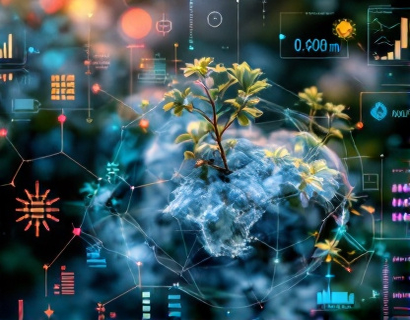Autonomous AI Agents: Maximizing Business and Personal Productivity with Continuous Objective Management
In the rapidly evolving landscape of technology, Autonomous AI Agents stand out as a transformative force, redefining how businesses and individuals manage tasks and achieve goals. These intelligent systems operate continuously, managing a wide array of tasks and objectives without human intervention, thereby freeing up time and resources for more strategic and creative endeavors. This article delves into the intricacies of how Autonomous AI Agents can streamline operations, enhance efficiency, and provide actionable strategies for maximizing productivity in both professional and personal contexts.
Understanding Autonomous AI Agents
Autonomous AI Agents are sophisticated software systems designed to perform tasks and manage objectives with minimal human oversight. These agents use advanced algorithms and machine learning techniques to adapt to new situations, learn from past experiences, and optimize their performance over time. Unlike traditional AI systems that require extensive programming for specific tasks, Autonomous AI Agents are equipped with the ability to handle a diverse range of activities, making them highly versatile and applicable across various industries.
The core functionality of these agents revolves around continuous objective management. They are programmed to set, prioritize, and execute tasks based on predefined goals and real-time data inputs. This capability ensures that the most critical tasks are always addressed first, while less urgent activities are managed efficiently in the background. The continuous nature of their operation means that these agents can work around the clock, eliminating the constraints of human fatigue and availability.
Benefits for Businesses
For businesses, the integration of Autonomous AI Agents can lead to significant improvements in operational efficiency and productivity. One of the primary benefits is the reduction of manual effort in routine and repetitive tasks. By automating these tasks, employees can focus on higher-value activities that require human creativity, critical thinking, and emotional intelligence. This shift not only enhances job satisfaction but also drives innovation and growth.
Another key advantage is the ability to maintain consistent performance levels. Human employees are prone to errors and variability in performance, especially under pressure or when dealing with complex tasks. Autonomous AI Agents, on the other hand, maintain a high level of accuracy and consistency, ensuring that tasks are completed reliably and efficiently. This reliability is particularly crucial in industries where precision and accuracy are paramount, such as finance, healthcare, and manufacturing.
Moreover, these agents can provide real-time insights and analytics, enabling businesses to make data-driven decisions quickly. By continuously monitoring and analyzing data, Autonomous AI Agents can identify trends, predict outcomes, and suggest optimal actions. This proactive approach allows businesses to stay ahead of the curve, respond to market changes swiftly, and maintain a competitive edge.
Enhancing Personal Productivity
Beyond the corporate world, Autonomous AI Agents offer substantial benefits for individuals seeking to enhance their personal productivity. In today’s fast-paced world, managing a balance between work, family, and personal life can be challenging. Autonomous AI Agents can act as personal assistants, handling a variety of tasks that consume significant time and mental energy.
For instance, these agents can manage schedules, set reminders, and coordinate appointments, ensuring that individuals never miss an important event or deadline. They can also assist in organizing digital spaces, such as emails and files, by categorizing and prioritizing messages and documents. This organization reduces the cognitive load, allowing individuals to focus on more meaningful activities.
Additionally, Autonomous AI Agents can help in personal goal management. Whether it’s fitness targets, learning new skills, or financial planning, these agents can set and track progress towards these goals. They can provide motivational prompts, adjust goals based on progress, and offer insights to help individuals stay on track. This continuous support system fosters a sense of accomplishment and motivation, driving individuals to achieve more than they might otherwise.
Practical Strategies for Maximizing Productivity
To fully leverage the potential of Autonomous AI Agents, both businesses and individuals can adopt several practical strategies. First, it’s essential to clearly define the objectives and tasks that the agents will manage. This clarity ensures that the agents focus on the most critical activities and avoid unnecessary distractions. Setting specific, measurable, achievable, relevant, and time-bound (SMART) goals can greatly enhance the effectiveness of these agents.
Second, integrating these agents with existing workflows and systems is crucial. Seamless integration ensures that the agents can access the necessary data and resources to perform their tasks efficiently. This integration can be achieved through APIs, cloud services, and other connectivity solutions. By ensuring smooth data flow, businesses and individuals can maximize the benefits of continuous objective management.
Third, continuous monitoring and optimization are key to sustaining productivity gains. Regularly reviewing the performance of Autonomous AI Agents helps identify areas for improvement and ensures that they are adapting to changing conditions. This might involve updating algorithms, refining task priorities, or adjusting goal settings based on new data and insights. A proactive approach to optimization keeps the agents aligned with evolving business and personal needs.
Lastly, fostering a culture of trust and collaboration between humans and AI is essential. While Autonomous AI Agents handle routine tasks, human oversight remains vital for strategic decision-making and creative problem-solving. Encouraging a symbiotic relationship where humans and AI agents complement each other’s strengths can lead to unprecedented levels of productivity and success.
Case Studies and Real-World Applications
To better understand the practical impact of Autonomous AI Agents, let’s explore a few real-world applications across different sectors.
In the healthcare industry, Autonomous AI Agents are used to manage patient schedules, monitor vital signs, and remind patients to take medications. These agents ensure that patients receive timely care and that healthcare providers can focus on more complex medical tasks. For example, an agent might send automated reminders to patients with chronic conditions, track their medication adherence, and alert healthcare providers if any anomalies are detected. This continuous monitoring and management improve patient outcomes and reduce the burden on medical staff.
In the retail sector, these agents can optimize inventory management, handle customer inquiries, and process orders. By automating these tasks, retailers can reduce operational costs and provide a smoother customer experience. An Autonomous AI Agent might analyze sales data to predict inventory needs, respond to customer questions through chatbots, and ensure that orders are processed and shipped promptly. This efficiency not only enhances customer satisfaction but also allows retail staff to focus on building customer relationships and driving sales.
In the realm of personal productivity, individuals can use Autonomous AI Agents to manage their daily routines. For instance, an agent might create and adjust daily schedules based on work commitments, personal appointments, and leisure activities. It can also handle tasks like booking travel, setting up meetings, and even managing household chores through smart home integration. By taking care of these logistical tasks, individuals can dedicate more time to personal growth, hobbies, and family.
Challenges and Considerations
While the benefits of Autonomous AI Agents are clear, there are several challenges and considerations that need to be addressed. One of the primary concerns is data security and privacy. These agents require access to sensitive information to function effectively, making it crucial to implement robust security measures. Encryption, access controls, and compliance with data protection regulations are essential to safeguard user data.
Another challenge is the initial setup and integration cost. Implementing Autonomous AI Agents can require significant upfront investment in technology and expertise. However, the long-term savings and productivity gains often justify this initial expense. Businesses and individuals should conduct a cost-benefit analysis to ensure that the investment aligns with their strategic goals.
Additionally, there is a need for continuous learning and adaptation. As businesses and personal needs evolve, Autonomous AI Agents must be updated and fine-tuned to remain effective. This ongoing process requires a commitment to staying informed about the latest AI advancements and best practices.
Future Trends and Innovations
The future of Autonomous AI Agents is promising, with several trends and innovations on the horizon. One significant trend is the integration of AI with other emerging technologies such as the Internet of Things (IoT), 5G networks, and edge computing. These integrations will enable more seamless and real-time interactions, further enhancing the capabilities of Autonomous AI Agents.
Another area of innovation is the development of more sophisticated natural language processing (NLP) and emotional intelligence. As agents become better at understanding and responding to human emotions, they will be able to provide more personalized and empathetic support. This advancement will be particularly beneficial in customer service, mental health support, and personal assistance.
Furthermore, the rise of decentralized AI systems and blockchain technology could lead to more secure and transparent Autonomous AI Agents. By leveraging blockchain, these agents can operate in a trustless environment, ensuring that data and transactions are immutable and verifiable. This could open up new possibilities in areas like supply chain management and identity verification.
Conclusion
Autonomous AI Agents represent a paradigm shift in how we approach productivity and task management. By continuously managing tasks and objectives, these intelligent systems enable businesses and individuals to focus on core activities, drive innovation, and achieve sustained success. The practical strategies outlined in this article, along with real-world applications and future trends, highlight the transformative potential of Autonomous AI Agents. As technology continues to advance, the role of these agents will only become more integral to our personal and professional lives.











































